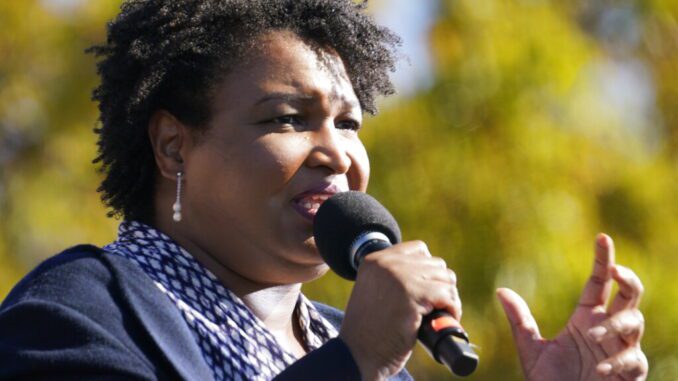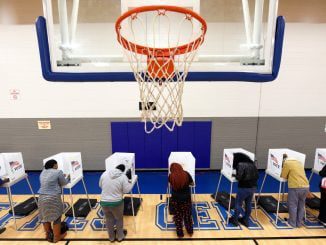
ATLANTA — President Joe Biden called Georgia’s new voting law an “atrocity.” A leading black bishop called for a national boycott of companies headquartered in the state. But when Stacey Abrams, who never conceded her loss in 2018, is asked about the law that has set much of her party on fire, she is critical but measured.
“These are laws that respond to an increase in voting by people of color,” Abrams told The Associated Press recently. But she discouraged boycotts and reassured Democrats they can still win races under the new rules, even as she hoped they would be struck down in the courts.
The approach demonstrates how Abrams, a former and potentially future candidate for governor, is navigating the politics in the new battleground. Abrams, her allies say, knows statewide Democratic victories — whether Biden’s in November or her own in 2022 — require winning more than just Democrats’ racially diverse and liberal base outraged over Republicans’ attempts to make it harder for some citizens to vote. Democrats also need moderate voters more reluctant to take sides on the matter.
“Stacey’s been responsible. She’s tried to create a dialogue where we can create change,” said Democrat Steven Henson, a former state legislative leader alongside Abrams.
Certainly, Abrams cannot be described as anything but a staunch opponent of the new law.
Her political organization, Fair Fight, backs federal lawsuits to overturn the changes. She’s frequented national cable networks and published national op-eds criticizing the measure. In the newspaper USA Today, she called on big business to oppose related GOP measures pending in Texas and elsewhere and to put corporate muscle behind Democrats’ counter proposals in Congress.
“Republicans are gaming the system because they’re afraid of losing an election,” Abrams told the AP.
Yet Abrams has mostly avoided harsh individual criticism of Gov. Brian Kemp, her 2018 Republican rival whom she once dubbed an “architect of voter suppression.” She rarely mentions former President Donald Trump, who falsely blames his defeat on voter fraud. And she’s pointedly not backed business boycotts of her home state or consumer boycotts of the major firms, including Delta Air Lines and the Coca-Cola Co., based there.
“I understand the notion of boycotts as a macro good,” she told the AP, noting her upbringing as a black woman in the Deep South and her parents’ voter registration work during the Jim Crow era. But Abrams said boycotts ultimately hurt “the victims of these bills.”
Abrams’ position puts her somewhat at odds with fellow activists. “It seems to infer that if we do absolutely nothing and the votes of Black people and people of color are suppressed, that is not a problem,” said Bishop Reginald Jackson of the African Methodist Episcopal Church in Georgia.
Biden declared the bill “un-American” and “Jim Crow in the 21st century.” Abrams doesn’t necessarily dispute those characterizations, noting that even the harshest Jim Crow voter suppression laws didn’t explicitly say “Black people can’t vote” but instead put up barriers. Still, she said the latest version, even if burdensome, could end up stoking Democratic turnout because of anger.
When Georgia’s corporate leaders came out in opposition to the law — although they had a hand in writing it — Kemp blamed Abrams and Biden. The companies, he said, were “scared” of Democrats and “caving” to “lies” about the final version.
Abrams, he said, is “raising millions off the fake outrage she has created.”
A recent Associated Press-NORC Center for Public Affairs Research poll found some partisan divisions among voters. About half of Americans support expanding access to early and mail voting, while about 3 in 10 opposed the ideas and the rest had no opinion. Automatic voter registration was the most popular Democratic proposal in the survey, endorsed by 60% of Americans. But an even larger majority — nearly three-quarters of all Americans, including majorities of both parties — expressed support for requiring photo identification.
Georgia voters will have many months to sort out who they believe.



